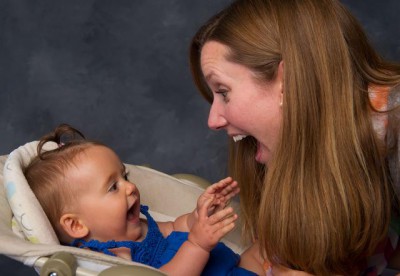Drs. Wendy Stone and Lisa Ibañez are co-authors on a study published recently in Developmental Psychology, which examined positive emotional engagement at 6 months of age in high-risk infants later diagnosed with ASD (HR/ASD infants; n= 11), high-risk infants without later ASD (HR/noASD infants ; n= 32), and low-risk infants (LR infants, n= 25). At the 6-month visit, infants and their parents completed the Face-to-Face Still-Face Protocol (FFSF), during which parents played with their infants for 3 minutes (i.e., face-to-face [FF] episode), then stopped interacting and maintained a neutral expression for 2 minutes (i.e., still-face [SF] episode), and finally resumed interacting with their infants for 3 minutes (i.e., reunion [RE] episode). Positive emotional engagement was examined during the two interactive episodes (i.e., FF and RE) as infants’ smiling rate (i.e., number of smile onsets per minute) as well as contingent responsiveness (i.e., the proportion of parent smiles to which infants responded with a smile); parents’ smiling rates and contingent responsiveness to their infants’ smiles were also examined during the two episodes and there were no differences between the three groups of parents. Diagnostic outcome was assessed for all infants at 36 months of age through a gold-standard ASD evaluation conducted by a licensed child psychologist.
For infants’ smiling rate, there was a significant decline between the FF and RE episode for LR infants only; HR/noASD infants exhibited a similar, but attenuated decline and HR/ASD infants exhibited no reduction across the episodes. It appears that LR infants may have been more sensitive than the HR groups to their parents’ non-responsiveness during the SF episode, which subsequently depressed their positive affect sharing during the RE episode. While infants’ levels of contingent responsiveness did not differ across the two episodes, HR/noASD infants exhibited significantly lower overall levels of contingent responsiveness than LR infants, but comparable levels to HR/ASD infants. These findings suggest that lower levels of positive emotional engagement among HR infants may be related to increased familial risk for ASD and not specifically to later ASD, which parallels findings from some of our previous studies examining shared positive affect within the first two years of life in HR infants (Gangi, Ibañez, & Messinger, 2014; Nichols, Ibañez, Foss-Feig, & Stone, 2014).
We’d like to extend special thanks to our collaborators at the University of Miami, who are the lead authors on this article, and to all of the families who participated and remained dedicated to this study over the course of almost 3 years!
Article Reference:
Lambert-Brown, B. L., McDonald, N. M., Mattson, W. I., Martin, K. B., Ibañez, L. V., Stone, W. L., & Messinger, D. S. (2015). Positive emotional engagement and autism risk. Developmental psychology, 51(6), 848-855.
